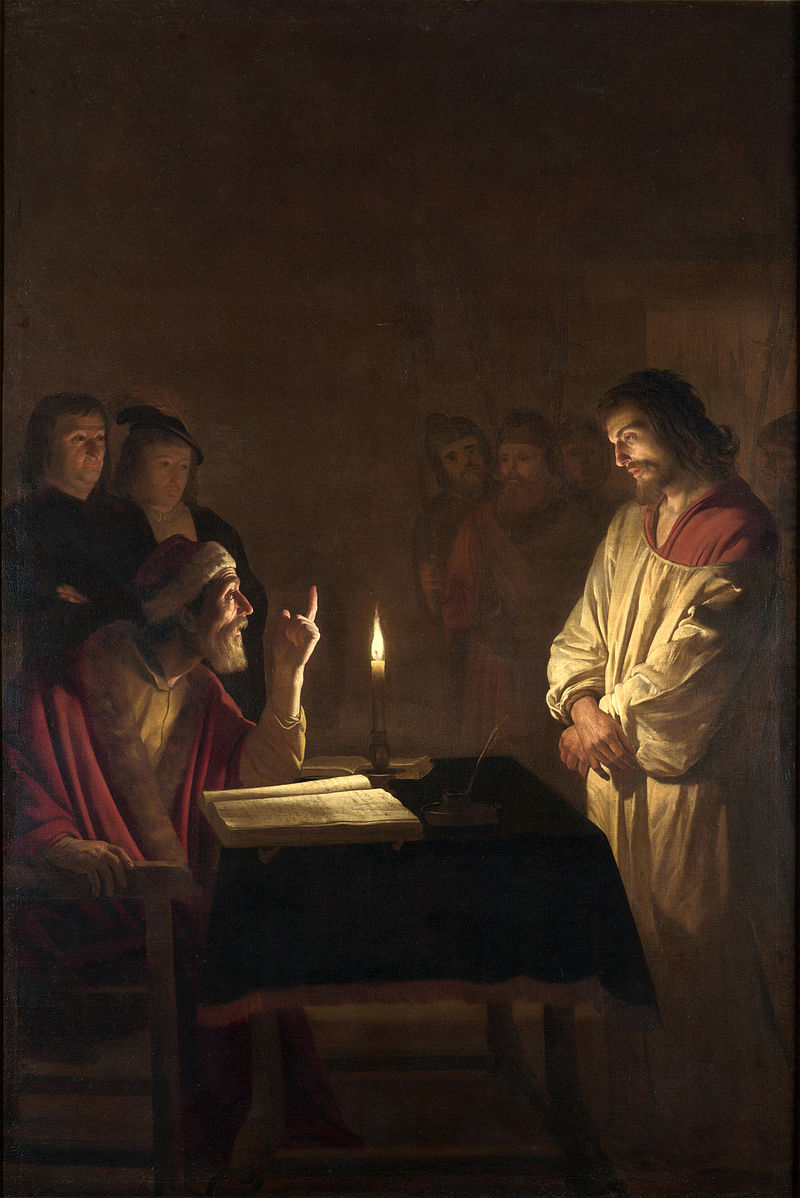[Greek] ἄκακος (akakos), [Latin] innocens: guileless, innocent, unsuspecting, simple, without fault, blameless, naïve; Rom.16:18, Heb.7:26

Christ Before the High Priest: painting by Gerard van Honthurst (1557)
Background information:
Christ Before the High Priest: This painting depicts the moment when Christ was brought before the Sanhedrin. This painting presents a series of contrasts between light and dark. The candle on the table provides the only source of visible light. The high priest cannot understand that the illuminated Jesus is the Light of the World. The high priest has the Law of Moses before him. Yet he cannot see that Jesus is the author (in which the quill pen leans toward Christ). The illuminated Christ stands in contrast to the dark shifty-eyed witnesses and soldiers. The accusatory high priest looks up at Jesus; while Jesus looks down at the high priest with pity (and sadness).
Greek Hellenism: This term means one who is upright, unknowing, simple, innocent, and unadulterated. Polybius’ Histories 3.98.5 states “To this man, who was of a guileless and gentle character, and quite dipossessed to trust him, Abilyx now introduced the subject of hostages.” Plato’s Timaeus 91d states “From men who are harmless but light-minded men—who are being students of the worlds above, suppose in their simplicity that the most solid points about such matters are obtained by sense of light.” Demosthenes’s Against Evergus and Mnesibulus 47.46 states “Theophemus, by bring this testimony to which no one else has disposed, and by pretending to be a man without guile, deceived the jurors.”
Old Testament: This term means simple, naïve, foolish, open-minded, wholesome, pure, upright, and undefiled. This person is one who can stand before God. God calls Job an upright and blameless man. This term frequently occurs in Proverbs, where the simple (unsullied by evil) have a greater wisdom in relationship to evil. Jeremiah call himself a trusting lamb to the slaughter. Philo, the Hellenistic Jewish philosopher, makes reference of innocents (children who have just come into life).
When the arrogant man is punished, the simple are the wiser (Pro.21:11). Yet I, like a trusting lamb to slaughter, had not realized that they were hatching plots against me (Jer.11:19). There was a man whose name was Job; and that man was blameless, upright, fearing God and turning away from evil (Job 1:1). Though I am guiltless, He will declare me guilty (Job 8:20). The testimony of the Lord is sure, make wise the simple (Psa.19:7). The naïve believes everything, but the sensible man considers his steps (Pro.14:15). The unfolding of Your words gives light; it gives understanding to the simple (Psa.119:130).
New Testament: This term means without fault, blameless, innocent, unsuspecting, and naïve. Paul warns others about those who do not serve the Lord Christ, using flattering speech in deceiving the hearts of innocent people. Paul was concerned that these Roman Christians would be influenced or corrupted by self-seeking teachers. Jesus is the High Priest, holy, innocent, undefiled, and separate from sinners. Jesus fulfills God’s promise in providing a priest of the order of Melchizedek.
Scripture:
“For such people do not serve our Lord Christ but their appetites, and by fair and flattering speech they deceive the hearts of the innocent.” Rom.16:18
Paul was concerned about the Roman Christians who would be influenced and corrupted by self seeking who cause divisions and contention.
“It was fitting that we should have such a high priest: holy, innocent, undefiled, separated from sinners, higher than the heavens.” Heb.7:26
Jesus the High Priest fulfills God’s oath regarding the priesthood of Melkizadek, making the Son of God the perfect priest.
Conclusion:
Innocent
Upon finishing this post, it dawned on me, “What image can I use to convey innocence or blamelessness?” I wasn’t naïve in thinking that this was going to be easy to figure out. Then I came across Gerard van Honthurst’s painting “Christ Before the High Priest”. This painting perfectly captures Jesus’ innocence.
In the Greek Hellenistic era, it seems very apparent that this term could be applicable in all situation or occasions (testifying, negotiating, and education).
In the Old Testament, this becomes an important term in this culture. God often looks favorably on the simple and upright person. It is interesting that this correlates with the notion that we should become childlike in our trust in God. It also seems that the simple persons can even show a certain kind of wisdom when encountering evil. God can also punish and correct the simple and naïve person. Philo calls young children as innocents.
Jesus is the promised High Priest who comes from the order of Melchizedek. Paul warns the Roman Christian about those self-seeking persons who seek to deceive and corrupt them.
I stand before you today claiming that I still have much to learn from the books of Hebrews and Romans. To say otherwise would be naïve on my part. It is simple as that!
